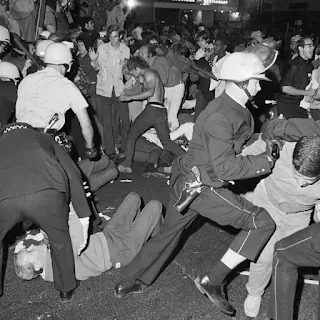The Past as Presence, Not Souvenir

In a review essay published in Harper’s in November 1984, historian Christopher Lasch examined the ways in which an ideologically driven critique of nostalgia “serves, as effectively as nostalgia itself, as a form of escapism. It shares with nostalgia an eagerness to proclaim the death of the past and to deny history’s hold over the present. Those who celebrate the death of the past and those who mourn it both take for granted that our age has outgrown its childhood. Both find it difficult to believe that history still haunts our enlightened, disillusioned maturity.”
Lasch observed that the word “nostalgia” had become a fixture in the “vocabulary of political abuse.” Among the scholars and pundits whose opinions about nostalgia he reviewed were Marshall Berman, Richard Louv, Richard Hofstadter, Alvin Toffer, Fred Davis, and Arthur Schlesinger, Jr.. The “nostalgic American,” wrote Lasch, “served liberals as an ideal whipping boy at a time when the intellectual foundations of liberalism were beginning to erode. As the dogma of progress became increasingly untenable, the ‘party of hope’ salvaged something of its self-confidence — the appearance if not the substance of hope — by deploring the nostalgic mood that allegedly made so many Americans afraid to face the future. By the early sixties, the denunciation of nostalgia had become a liberal ritual, performed, like all rituals, with a minimum of critical reflection.”
Lasch was as critical of the lack of critical reflection by those who enjoyed nostalgia as he was of those who deplored it. As he argues at the end of the article, “Nostalgia neither provides a necessary sense of continuity in a time of rapid change nor serves as unadulterated escapism. It evokes the past only in order to bury it alive. The atmosphere of sentimental regret with which it surrounds the past has the effect of denying the past’s inescapable influence over the present. All of us, both as individuals and as a people, are shaped by past events more than we can fully understand: and never more decisively than when we think we have put those events behind us. Just when we think we have disentangled ourselves from the web of associations that forms our personal and collective identity, some unbidden memory, some obsession or compulsion, some reactivation of former distress, some reversion to habits we assumed we had outgrown reminds us that none of us enjoys the freedom to ‘create our own identity,’ in the jargon of popular psychology. Except within limits severely circumscribed, we cannot choose what we wish to become or even what we wish to remember. Memories that cause us pain can only be repressed, never banished altogether, and they control us most of all when we think we have managed to forget them. It is the knowledge of our dependence on the past that nostalgia and anti-nostalgia alike seek to repel.
“One of the delusions peculiar to our age is that we can manipulate the past to suit our immediate purposes and that having freed ourselves from the influence of cultural traditions, we can adopt an eclectic approach to history, appropriating whatever we need in order to piece together a ‘usable past.’ The ‘postmodern’ revival of earlier styles in art, architecture, popular music, and dress serves not to bring them back to life but precisely to exaggerate our distance from them. It is only when they are believed safely dead that earlier styles become eligible for restoration, not as landmarks in a continuing tradition but as historical curiosities, objects of a kind of attention that mingles affection and condescension. Revivals deny any living link with past objects. They endow those objects with the charm of distance and inconsequence. Our sense of discontinuity is now so great that even very recent periods, like the fifties or the sixties, have become objects of nostalgic retrospect. Eager to deny that events in those decades continue to haunt our politics and our culture, we consign them to the irrelevance of the good old days.
“The ‘nostalgia boom’ of the seventies first took shape as a media promotion, a non-event that proclaimed the demise of the sixties — of protest marches, riots, and countercultures. When the editors of Time in 1971 asked Gore Vidal to explain ‘the meaning of nostalgia,’ he replied, ‘It’s all made up by the media. It’s this year’s thing to write about.’ I see no reason to dispute this assessment. Vidal may have underestimated the subject’s staying power, but he was right in thinking that the media are far more interested in nostalgia than ordinary men and women. This is because ordinary men and women live in a world in which the burden of the past cannot easily he shrugged off by creating new identities or inventing usable pasts. Ordinary men and women are much more obviously and inescapably prisoners of circumstance than those who set cultural fashions. These circumstances include the constraints of inherited poverty, parental religion, and ethnic identification, and in many cases the inherited experience of racial or ethnic persecution. Trapped in a past not of their making, most people cannot afford the illusion that tradition counts for nothing, even if much of their energy goes into a struggle against it.
“Only those who have escaped from the ghetto, the small town, or the farm can believe that they no longer carry the weight of a personal and collective history. Because it is difficult for those who command the mass media, and increasingly for the educated classes in general, to imagine a past that is continuous with the present, they swing between nostalgia and a violent condemnation of nostalgia, both of which betray the same sense of dislocation. Highly susceptible to nostalgia themselves, they are quick to condemn it in others.
“Whether pining for things past or rebuking others for this fault, the educated classes seek to avoid any painful reckoning with the historical record from which they think they have liberated themselves. Unfortunately for their peace of mind, the legacy of unsolved social and political problems makes such a reckoning more and more difficult to postpone.”
— from Christopher Lasch, “The Politics of Nostalgia,” Harper’s, November 1984, pp. 65–70.



